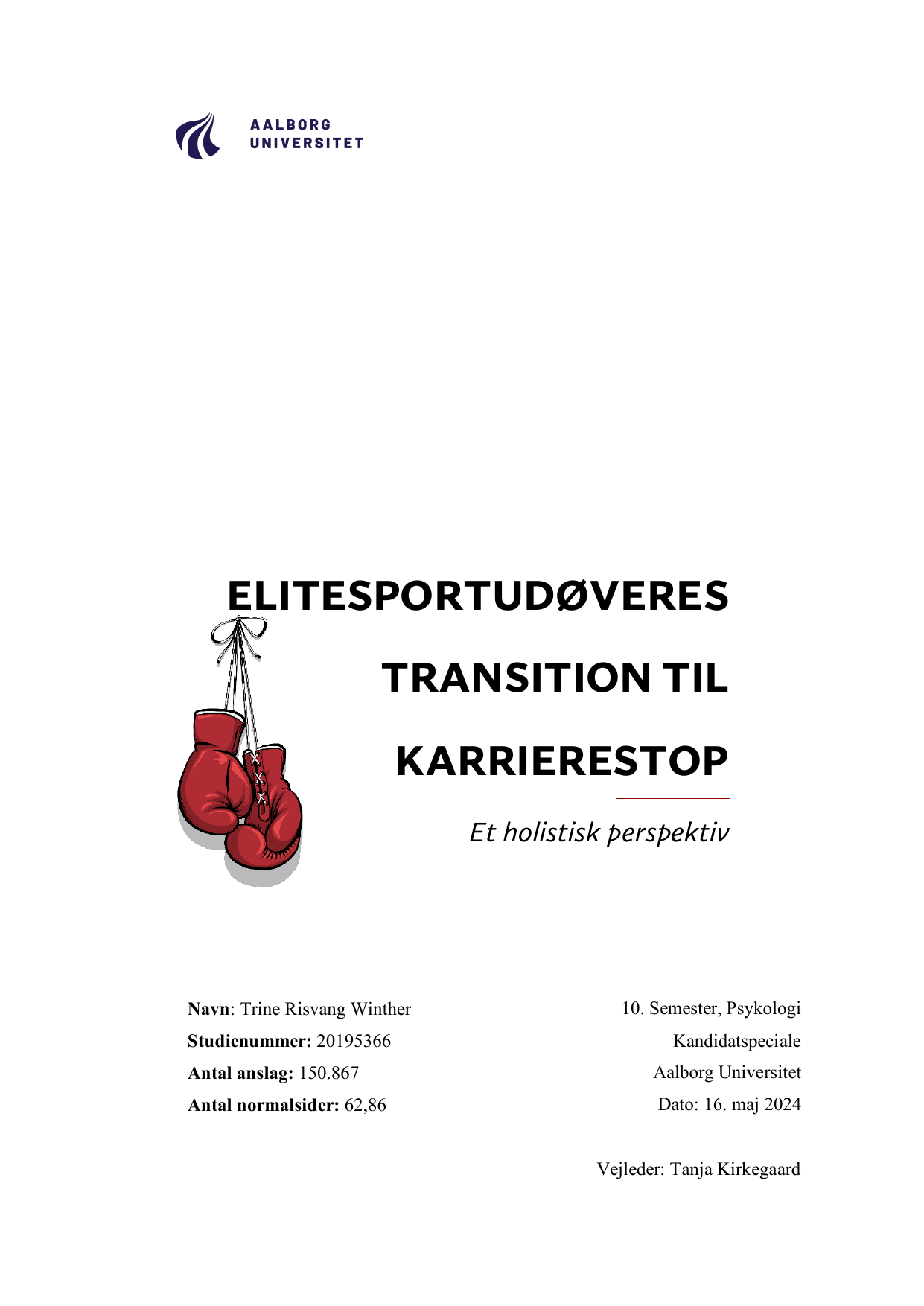
Elitesportsudøveres transition til karrierestop: Et holistisk perspektiv
Oversat titel
Elite athletes' transition to career end: A holistic perspective
Forfatter
Semester
4. semester
Uddannelse
Udgivelsesår
2024
Afleveret
2024-05-16
Antal sider
77
Abstract
The purpose of the current thesis is to investigate elite athletes' transition to career end based on the following problem formulation: Which factors can have an impact on professional elite athletes' experience and handling of transition to career end, and how can it affect the individual psychologically? The thesis uses the biopsychosocial model as framework and draws upon theory and research relating to both biological, psychological, and social factors in an attempt of establishing a more holistic perspective on the subject than previous research has done. The findings of the analysis have shown that elements such as a strong and exclusive athletic identity can cause emotional difficulties and in certain cases an identity crisis during a transition. In addition, much indicates that an individual's locus of control has a certain influence on how a transition is handled. The results further show that the loss of community and social identity established throughout a career can cause loneliness and a low degree of self-worth and self-understanding if the athlete has not prioritized building other communities and affiliations outside the sport. Likewise, social support from primary persons, coaches and sports organisations, as well as having prepared for a transition and a new career with e.g. dual-career is of great importance for the quality of a transition and can cause psychological challenges if the athlete has not prepared. The study further finds that there are indications that some athletes can get addicted to the “kick” received by winning competitions or the social recognition the athlete gets from being successful in the sport. This, in turn, can make the transition more difficult as the athlete may experience withdrawal symptoms when the recognition disappears and the ability to win competitions is not there anymore, and this might be a catalyst for emotional disturbances, depression or depression-like symptoms. In addition, there are indications that the experience of status decline after a transition can cause the individual to develop depression or depressive symptoms. The results of the analysis can however be challenged, as there are certain methodological problems with some of the theories and research involved. Historically most research regarding addiction is based on animal studies and conclusions should be transferred to humans with caution. Lately there has been an increase in research on humans and their brain functions regarding the reward system which strengthens the findings deducted from the current study. There is, however, a lack of research into whether elite athletes can become addicted to recognition and success before it can finally be concluded that this is the case, although much indicate it. Both theoretically and empirically there are some indications that there is a relation worth exploring which makes it an evident implication for future research. This could be done by a mixed method study based on qualitive interviews with elite athletes to draw valuable insights and building hypothesis followed by quantitative sampling from various organizations and sports. In this regard much could be learned from comparing the way other behavioural addictions is researched. Furthermore, it is suggested supplementing the research by biological studies. This could be brain scans to evaluate the athlete’s dopamine levels and reward system activity before and after transitioning towards career end. As practical implications the study proposes that the biopsychosocial model is used actively on athletes. This entails having conversations with and screening elite athletes while still being active to evaluate their mental state in terms of the above-mentioned biological, psychological, and social factors and the findings of the analysis in order to be able to intervene in time if necessary. The study furthermore stresses the importance of both openly articulating the issue and publicly addressing the challenges that elite athletes are experiencing when transitioning towards career end. A suggestion is campaigns in the elite environments that focus on both mental well-being and health, but also specifically transition to career end and the time after sports careers, and how to prepare for it as best as possible.
Emneord
